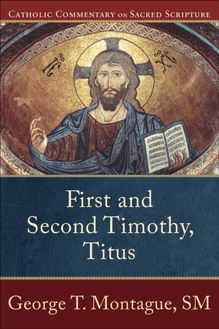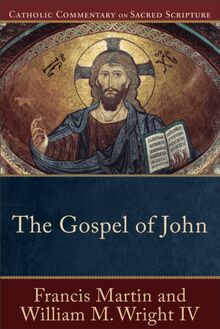Gospel of Mark (Catholic Commentary on Sacred Scripture) , livre ebook
252
pages
English
Ebooks
2008
Vous pourrez modifier la taille du texte de cet ouvrage
Obtenez un accès à la bibliothèque pour le consulter en ligne En savoir plus
Découvre YouScribe en t'inscrivant gratuitement
Découvre YouScribe en t'inscrivant gratuitement
252
pages
English
Ebooks
2008
Vous pourrez modifier la taille du texte de cet ouvrage
Obtenez un accès à la bibliothèque pour le consulter en ligne En savoir plus
Publié par
Date de parution
01 novembre 2008
Nombre de lectures
0
EAN13
9781441201980
Langue
English
Poids de l'ouvrage
5 Mo
Publié par
Date de parution
01 novembre 2008
Nombre de lectures
0
EAN13
9781441201980
Langue
English
Poids de l'ouvrage
5 Mo
Cover
Series Page
Catholic Commentary on Sacred Scripture
S ERIES E DITORS
Peter S. Williamson
Mary Healy
A SSOCIATE E DITOR
Kevin Perrotta
C ONSULTING E DITORS
Scott Hahn , Franciscan University of Steubenville
†Daniel J. Harrington, SJ , Weston Jesuit School of Theology
William S. Kurz, SJ , Marquette University
†Francis Martin , Dominican House of Studies
Frank J. Matera , Catholic University of America
George Montague, SM , St. Mary’s University
Terrence Prendergast, SJ , Archbishop of Ottawa
Title Page
Copyright Page
© 2008 by Mary Healy
Published by Baker Academic
a division of Baker Publishing Group
P.O. Box 6287, Grand Rapids, MI 49516-6287
www.bakeracademic.com
Ebook edition created 2011
Ebook corrections 10.02.2014, 07.26.2017, 12.25.2017, 10.01.2018
All rights reserved. No part of this publication may be reproduced, stored in a retrieval system, or transmitted in any form or by any means—for example, electronic, photocopy, recording—without the prior written permission of the publisher. The only exception is brief quotations in printed reviews.
Library of Congress Cataloging-in-Publication Data is on file at the Library of Congress, Washington, D.C.
ISBN 978-1-4412-0198-0
Nihil Obstat :
Rev. Christopher Begg
Censor Deputatus
Imprimatur :
Rev. Msgr. Barry C. Knestout
Vicar for Administration
Archdiocese of Washington
March 6, 2008
The nihil obstat and imprimatur are official declarations that a book or pamphlet is free of doctrinal or moral error. There is no implication that those who have granted the nihil obstat and the imprimatur agree with the content, opinions, or statements expressed therein.
Excerpts from the New American Bible with Revised New Testament and Psalms Copyright © 1991, 1986, 1970 by the Confraternity of Christian Doctrine, Washington, D.C. Used with permission. All Rights Reserved. No part of the New American Bible may be reproduced in any form without permission in writing from the copyright owner.
Endorsements
“In preparing for the international Synod of Bishops on ‘The Word of God in the Life and Mission of the Church,’ Pope Benedict XVI reminded the Church that a prayerful study of the Scriptures is at the heart of the Church’s renewal. The new Catholic Commentary on Sacred Scripture promises to directly serve that purpose. Drawing on sound biblical scholarship, the commentaries present the reader with the rich harvest of that study, reflecting on the message of the biblical text and engaging the life of faith from a Catholic perspective.”
— Donald Senior, CP , president, Catholic Theological Union
“This series promises to be spiritually and doctrinally informative, based on careful, solid biblical exegesis. The method and content of this work will be helpful to teachers of the faith at different levels and will provide a reliable guide to people seeking to deepen their knowledge and thereby nourish their faith. I strongly recommend the Catholic Commentary on Sacred Scripture.”
— Cormac Cardinal Murphy-O’Connor , Archbishop of Westminster
“I welcome with great joy the launch of this new collection of commentaries on the Bible because the project corresponds perfectly to a pressing need in the Church. I am speaking about exegetical studies that are well grounded from a scholarly point of view but not overburdened with technical details, and at the same time related to the riches of ancient interpretation, nourishing for spiritual life, and useful for catechesis, preaching, evangelization, and other forms of pastoral ministry. This is the kind of commentary for which the majority of readers have a great desire.”
— Albert Cardinal Vanhoye, SJ , Pontifical Biblical Institute, former secretary of the Pontifical Biblical Commission
“When the Scripture is read in the liturgy, it is heard as a living voice. But when expounded in a commentary, it is too often read as a document from the past. This fine new series unites the ancient and the contemporary by offering insight into the biblical text—verse by verse—as well as spiritual application to the lives of Christians today. I particularly like the sidebars inserted into the text called ‘Living Tradition’ that feature memorable sayings from great Christian teachers or brief explanations of puzzling terms and ideas.”
— Robert Louis Wilken , University of Virginia
“This new Bible commentary series is based on solid scholarship and enriched by the church’s long tradition of study and reflection. Enhanced by an attractive format, it provides an excellent resource for all who are serving in pastoral ministry and for the individual reader who searches the Scriptures for guidance in the Christian life.”
— Emil A. Wcela , Auxiliary Bishop (retired), Diocese of Rockville Centre; past president, Catholic Biblical Association
“The Catholic Commentary on Sacred Scripture is an ideal tool for living our faith more deeply. This extraordinary resource combines superior scholarship and a vivid, accessible style that will serve the interested layperson and the serious scholar equally well. It feeds both the mind and the heart and should be on the shelf of every committed Catholic believer. I highly recommend it.”
— Charles J. Chaput, OFM Cap , Archbishop of Denver
“This new commentary series appears to me to be a gift of the Holy Spirit to Catholic clergy, religious, and laity at this historic moment. Pope Benedict has effectively announced the rebirth of Catholic biblical theology, bringing together Scripture, tradition, and the teachings of the Church. This commentary reflects not only biblical criticism but also the unity of the Word of God as it applies to our lives. This is a marvelous and timely introduction.”
— Benedict J. Groeschel, CFR , author and preacher
“This new commentary series should meet a need that has long been pointed out: a guide to Scripture that will be both historically responsible and shaped by the mind of the Church’s tradition. It promises to be a milestone in the recovery of a distinctively Catholic approach to exegesis.”
— Aidan Nichols, OP , University of Oxford; Fellow of Greyfriars, Oxford
“This series employs the Church’s methodology of studying Sacred Scripture in a faithful, dynamic, and fruitful way. With interest in Catholic Bible studies growing rapidly, the repeated question has been, ‘can you suggest a reliable commentary?’ The Catholic Commentary on Sacred Scripture is now the go-to resource that I can enthusiastically recommend to all my students.”
— Jeff Cavins , founder, The Great Adventure Catholic Bible Study System
Dedication
To Fr. Francis Martin
Contents
Cover
Series Page
Title Page
Copyright Page
Endorsements
Dedication
Illustrations
Editors’ Preface
Abbreviations
Introduction
Outline of Mark
Prologue to the Gospel (1:1–13)
A New Teaching with Authority (1:14–45)
Physician, Bridegroom, and Lord of the Sabbath (2:1–3:6)
A New Israel and a New Family (3:7–35)
Parables of the Kingdom (4:1–34)
Authority over Nature, Demons, Disease, and Death (4:35–5:43)
Jesus Comes to His Own (6:1–32)
Understanding the Bread I (6:33–7:37)
Understanding the Bread II (8:1–26)
On the Way of Discipleship I (8:27–9:29)
On the Way of Discipleship II (9:30–50)
The Gospel in Daily Life (10:1–31)
On the Way of Discipleship III (10:32–52)
The Lord Comes to His Temple (11:1–26)
The Authority of the Son (11:27–12:44)
The Beginning of the End (13:1–37)
The Hour of Decision (14:1–31)
Betrayal and Condemnation (14:32–72)
The Crucifixion (15:1–47)
The Resurrection (16:1–20)
Suggested Resources
Glossary
Index of Pastoral Topics
Index of Sidebars
Map
Notes
Back Cover
Illustrations
Figure 1. The Jordan River
Figure 2. Ruins of a fourth-century synagogue at Capernaum
Figure 3. Person suffering from leprosy
Figure 4. The “Jesus Boat”
Figure 5. A first-century Palestinian lamp
Figure 6. Ancient sandals found at Masada
Figure 7. Ancient Jewish pottery found at Qumran
Figure 8. Ancient millstone found at Capernaum
Figure 9. Scale model of the Herodian Temple
Figure 10. Diagram of the Herodian Temple
Figure 11. Stone with inscription forbidding Gentiles to enter
Figure 12. Tiberian Denarius
Figure 13. Caesar Nero
Figure 14. Panel from the Arch of Titus
Figure 15. Reconstruction of a Roman scourge
Figure 16. Heel bone of first-century crucified man
Editors’ Preface
The Church has always venerated the divine Scriptures just as she venerates the body of the Lord.… All the preaching of the Church should be nourished and governed by Sacred Scripture. For in the sacred books, the Father who is in heaven meets His children with great love and speaks with them; and the power and goodness in the word of God is so great that it stands as the support and energy of the Church, the strength of faith for her sons and daughters, the food of the soul, a pure and perennial fountain of spiritual life.
Second Vatican Council, Dei Verbum 21
Were not our hearts burning while he spoke to us on the way and opened the scriptures to us?
Luke 24:32
The Catholic Commentary on Sacred Scripture aims to serve the ministry of the Word of God in the life and mission of the Church. Since Vatican Council II, there has been an increasing hunger among Catholics to study Scripture in depth and in a way that reveals its relationship to liturgy, evangelization, catechesis, theology, and personal and communal life. This series responds to that desire by providing accessible yet substantive commentary on each book of the New Testament, drawn from the best of contemporary biblical scholarship as well as the rich treasury of the Church’s tradition. These volumes seek to offer scholarship illumined by faith, in the conviction that the ultimate aim of biblical interpretation is to discover what God has revealed and is still speaking through the sacred text. Central to our approach are the principles











